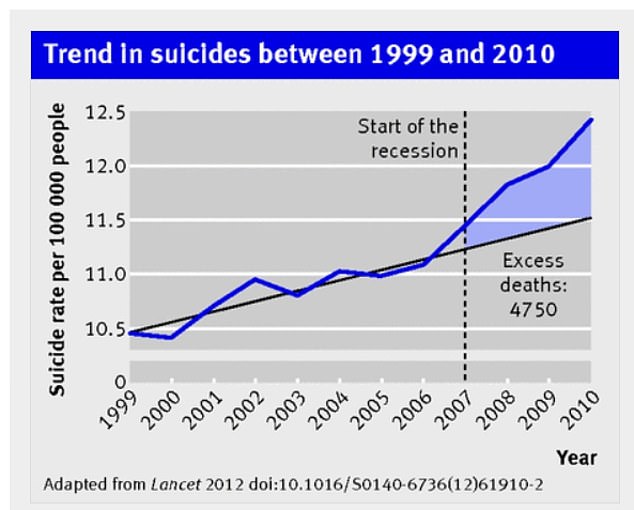The terrifying connection between stock market declines and the health of ordinary Americans
This week’s financial panic is not only raising concerns about people’s savings, investments and job prospects.
Trends from past economic crises show that a market downturn can negatively impact the health of ordinary Americans for years to come.
When America is in a recession, there are typically spikes in suicides, alcohol and drug abuse, heart attacks, strokes, and childbirth complications.
And it increasingly looks like this is going to become a reality after the latest wave of economic uncertainty.
Research has pointed to an increase in a wide range of negative health outcomes associated with financial stress, which became apparent following the 2008 economic crisis.
Goldman Sachs economists put the chance of the US economy entering a recession within the next 12 months at 15 to 25 percent this weekend.
Fears of a US recession, fuelled by data showing an unexpected rise in unemployment, sparked a global stock market sell-off on Monday.
The link between health and recessions has now been clearly demonstrated, and it doesn’t just affect Wall Street bankers.
The effects of a recession on unemployment, falling wages, rising debt, and higher housing prices all have a major impact on the daily lives of all Americans.
The last time the US was in a recession was after the 2008 financial crisis.
In 2009, there were about 5,000 more suicides recorded than you would expect in an average year, an increase of about 15 percent.
And the number of suicides continued to increase in the following years.
Between 2000 and 2009, only 22 states experienced a large increase in suicides.
But from 2009 to 2018, 41 states saw their suicide rates rise significantly, with the District of Columbia seeing the largest increase of 70 percent.
Research has shown that financial problems, such as unemployment, difficulty finding a job, credit card and other debt, and low income, can increase a person’s risk of suicide by up to twenty times.
It can also lead a person to turn to excessive drinking or drug use to cope with the devastating emotional impact of debt, unemployment, and loss of income.

In addition to the fact that chronic stress associated with financial crises increases the risk of heart attack or stroke, it can also increase the risk of depression and even suicidal thoughts.
The number of deaths from cirrhosis of the liver due to excessive drinking increased by almost 14 percent in 2009 compared to 2006. From 4.4 deaths per 100,000 people, the number of deaths in 2009 increased by 4.4 percent to about five deaths per 100,000 people in 2009.
And with fentanyl causing record numbers of overdose deaths, experts like licensed therapist Colleen Marshall worry that a growing sense of hopelessness and depression could drive those numbers even higher.
Ms Marshall, a therapist at the Two Chairs therapy group in California, told DailyMail.com: ‘The crash of the Great Depression, that was historically quite closely associated with a significant increase in suicidality, people feeling hopeless. And then 2008 makes sense, there was a correlation there.
“History repeats itself,” she said.
“I would look at it this way: If the factors that led to the increase in suicides in 2008 and the increase in 1929 are similar to what we see historically today, then you can kind of infer that another recession would likely have a similar impact.”
Similar trends were seen in other parts of the world. During the 1997 economic crisis in Japan, South Korea and Hong Kong, there were an estimated 10,000 additional suicides from 1997 to 1998.
Reports from the Great Depression show that suicide rates were also rising. In 1929, there were 17 suicides per 100,000 people. By 1932, that number had risen to 21.3 suicides per 100,000 people, an increase of about 25 percent, according to economist John Kenneth Galbraith.
According to Ms. Marshall, anyone can experience the type of deep despair that can result in a fatal act of self-harm. But the average American can feel the effects of a recession more acutely.
According to Marshall, a financial crisis is always “a real risk factor and a trigger” for depression and suicidal behavior, ranging from unemployment and not being able to find a job to the threat of becoming homeless.
According to Marshall, a financial crisis, even if it does not lead to suicide, is closely related to depression, and a powerful executive can be affected by it just as quickly as the average person.
“For someone being fired as CEO of a large Fortune 500 company, it can be the same kind of ego bruising that also leads to despair.”
But it’s not just depression and suicide rates that may be increasing.

Constantly worrying about your finances and ability to provide for yourself or your family can lead to chronic stress, which has a major impact on your risk of chronic diseases, such as high blood pressure and stroke.
A 2018 study looked at 106 people with heart attacks who went to a Johannesburg hospital. The study found that patients who experienced significant financial stress, a 13 times higher risk people with little to no financial stress.
One of the consequences of the 2008 crash was a huge increase in heart problems.
In the U.S. counties that suffered most from job losses, homelessness and debt, the rate of deaths from heart disease rose sharply between 2010 and 2015, from 122 to 127.6 deaths per 100,000 residents.
Dr. Sameed Khatana, a cardiovascular researcher at the University of Pennsylvania, said: “Big economic trends that we read about in the newspaper – things like recessions and job losses – really have an impact on particular communities and the cardiovascular health of the people who live in those communities.”
The financial crisis has also been linked to an increase in the number of strokes.
Researchers in Ireland, which was hit hard by the 2008 economic crisis, reported that stroke deaths increased by about 17 percent between 2007 and 2010 compared with the pre-crisis period.
Financial problems have also been linked to insomnia. three quarters of Americans have had sleepless nights due to fears of an economic recession.
Dr. Susheel Patil, sleep physician and spokesperson for the American Academy of Sleep Medicine said: ‘Persistent, anxious thoughts can make it difficult to fall asleep and affect the quality of your sleep. It is therefore understandable that a significant number of Americans are having trouble sleeping during this period of economic instability, inflation and job uncertainty.’
Chronic stress about money also increases the risk of dementia later in life, and also the risk of dementia in pregnant women. chance of premature delivery to an underweight baby.
It is well documented that financial stress is a persistent assault on mental and physical well-being.
If you think about it, the body activates a stress response by releasing cortisol and adrenaline.
Chronic activation of these hormones during chronic stress leads to high blood pressure, immune system problems, and inflammation, increasing the risk of a long list of heart and neurological problems.
In addition to the physiological effects of stress, financial instability hinders a person’s ability to live in a safe, stable environment, afford healthy foods that promote health, and seek support in the form of stress therapy.
a 2023 review of 98 articles focusing on the global impact on mental health, concluded that a rise in unemployment following a financial crisis ‘demonstrably predicted the prevalence of anxiety and depression in the general population.
The study also found that even among people who were employed, the negative consequences of working in the private sector – lower income, bank loans, increased workload, falling corporate profits or stock market losses, increasing age or being ‘bullied’ at work – can lead to an increase in mental illness.
The current recession fears are not unfounded. In the wake of a disappointing jobs report, the Fed’s lack of interest rate action and Monday’s massive stock sell-off, Goldman Sachs economists raised the probability of a recession in the coming year to 25 percent from 15 percent.
